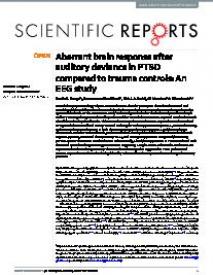Aberrant brain response after auditory deviance in PTSD compared to trauma controls : An EEG study.
Part of the symptomatology of post-traumatic stress disorder (PTSD) are alterations in arousal and reactivity which could be related to a maladaptive increase in the automated sensory change detection system of the brain. In the current EEG study we investigated whether the brain’s response to a simple auditory sensory change was altered in patients with PTSD relative to trauma-exposed matched controls who did not develop the disorder.
Thirteen male PTSD patients and trauma-exposed controls matched for age and educational level were presented with regular auditory pure tones (1000 Hz, 200 ms duration), with 11% of the tones deviating in both duration (50 ms) and frequency (1200 Hz) while watching a silent movie. Relative to the controls, patients who had developed PTSD showed enhanced mismatch negativity (MMN), increased theta power (5–7 Hz), and stronger suppression of upper alpha activity (13–15 Hz) after deviant vs. standard tones.
Behaviourally, the alpha suppression in PTSD correlated with decreased spatial working memory performance suggesting it might reflect enhanced stimulus-feature representations in auditory memory. These results taken together suggest that PTSD patients and trauma-exposed controls can be distinguished by enhanced involuntary attention to changes in sensory patterns.
In: Scientific Reports, ISSN 2045-2322. | 7 | 1 | 16596
http://doi.org/10.1038/s41598-017-16669-8


